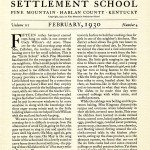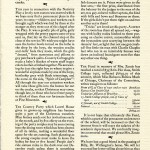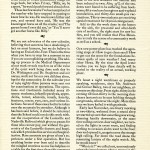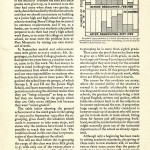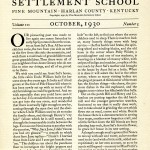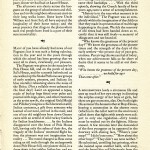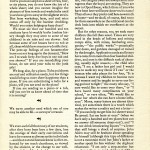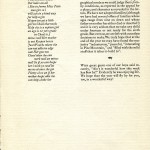Pine Mountain Settlement School
Series 17: PUBLICATIONS PMSS
NOTES 1930
February and October
NOTES – 1930
“Notes from the Pine Mountain Settlement School”
February and October
GALLERY: NOTES – 1930 February
The [Nativity] Play, of which one loves to be a part, which has grown with the school, added to a little here, changed a bit there, written partly by the children, partly by Mrs. Zande.
- NOTES – 1930 February, page 1. [PMSS_notes_1930_feb_001.jpg]
- NOTES – 1930 February, page 2.[PMSS_notes_1930_feb_002.jpg]
- NOTES – 1930 February, page 3.[PMSS_notes_1930_feb_003.jpg]
- NOTES – 1930 February,, page 4.[PMSS_notes_1930_feb_004.jpg]
TAGS: NOTES – 1930 FEBRUARY: Little School, Nativity Play, Country Party, Line Fork, Dr. Ida Stapleton, Big Laurel, Dr. Alfreda Withington, Miss Marian Kingman, cooking classes, Miss Evelyn Wells, Ethel de Long Zande Memorial Fund, dental clinics, power plant, night watchmen, Mental and Achievement Tests, raising academic standards
TRANSCRIPTION: 1930 February
P. 1
NOTES FROM THE
PINE MOUNTAIN
SETTLEMENT SCHOOL
PINE MOUNTAIN * HARLAN COUNTY * KENTUCKY
Copyright, 1930, by Pine Mountain Settlement School
Volume III FEBRUARY, 1930 Number 4
FIFTEEN rather battered enamel cups hang on nails in one corner of Uncle William‘s old store. These are for the mid-morning soup which Mrs. Callahan, the teacher, makes on the heating stove for her small scholars. This is the “Little School” which Pine Mountain has fostered for the youngest of its immediate neighbors, – -fifteen small people for whom the two or three mile walk to the nearest district school is too difficult. There must be twenty-five children in a district before the County provides a school. This winter the Little School was organized by a committee of parents on Isaac’s Run and they employ their teacher, provide the building and equipment, while we take care of the teacher’s living as our share. Columbus Creech was glad to give his father’s old store for this purpose, and he put in two new windows to let more sunshine in along with the knowledge that these eager young minds seek in the little building where once we helped Uncle William with the mail and his book-keeping.
We warn you not to visit school on a busy morning for it is difficult to escape from the allurement of small Clyde, going on five, who goes up front to sing to you and speaks his piece until big sister, Ola May, aged six, gets up to raise the tune. Ola May is the song leader of the school and it is a lovely sound to carry home down the road with you, — the piping of that childish treble in “How many miles to Boston town?”
***
UNTIL the seven months district schools close at the end of January, each Friday Miss [Marian] Kingman mounts her nag and rides down towards Incline to hold her cooking class for girls in one of the neighbor’s kitchens. The district school allows the girls two hours to attend out of the school day. In November we visited the class and a real adventure it was in what it means to work from the bottom up for the improvement of living conditions. Six little girls ranging in age from nine to fifteen came that day, and a young matron, an old Pine Mountain girl, was taking her turn at being hostess to the class. She sat by the fire rocking her baby son, while the little girls, one of whom had walked four miles to come, bustled about her kitchen, so business-like in their clean aprons and so interested in what they were doing. The dishes to be made that day were creamed cabbage with white sauce, and stuffed potatoes.
While the cabbage was boiling and the potatoes baking, Miss Kingman dictated the recipes and everyone wrote laboriously in their oilcloth-covered note books. This year the children have learned to make canned beans, canned corn, baked apples, scrambled eggs, poached eggs, candied sweet potatoes, potato soup, cinnamon buns, corn chowder, and floating island. Sitting around the oil-cloth-covered table in the kitchen afterwards, eating up the class product, as is the pleasant custom, we found that not one of the six little cooks had ever eaten creamed cabbage or stuffed potatoes before. Yet there is not a family which does not possess these raw materials.
As the little girls washed and dried dishes and swept out the room leaving everything spick and span, we were reminded of the…
[1]
P. 2
…fairy tale in which the cobbler had elfin help in his labors. After the children have gone back to school does the hostess, we wonder, look at her spotless kitchen, and wonder if she went to sleep and dreamt it all? The proof is only to be found in the small heads and the oilcloth-covered books, and what we hope happens in the little homes along the creeks.
***
THIS year in connection with the Nativity Play a lovely new custom was started which we hope may find a permanent place in the years to come, — children and workers each brought a gift which was laid by them at the manger as they went out of the chapel after the Play. It was a goodly pile of gifts, gaily wrapped with the pretty papers some of you sent us, that lay on the chancel step at the close of the service. We wish you might have seen the butter bowls turned on the lathe in the shop by the boys, the wooden cradles and dolls’ beds they made, which the girls “dressed,” from mattresses and pillows to gay patchwork quilts. Country Cottage girls made a baby’s blanket of warm stuff in gay colors feather-stitched together. We are waiting for just the right boy to whom to give a wonderful airplane made by one of the boys, battleship gray with black trimmings, and the name on the side, “Spirit of Camphor”! All through the year our extension workers will take these gifts into the homes far out on the creeks, so that Christmas may come, though late, to those who have fewer people to think of them than our fortunate family at Pine Mountain.
***
THE Country Party which Laurel House gives to grown-up neighbors has become quite a part of the Christmas vacation. Miss [Ruth B.] Gaines sends out her invitations early in the month, and by five-thirty on the evening of the party couples may be seen coming into the dining room which has been cleared of all its tables, making a wonderful floor space for the set-running. Such planning as the young couples must make to leave the babies for four or five hours! People don’t ride sixteen miles in the dark over our December roads unless there is something they really want at the end. “I never get to go to any other party,” a young mother said to us. She missed last year’s party because of a new baby, and perhaps that is why no one seemed to enjoy it more this year. How light her feet were in the set-running! You could not realize that she had tucked six children into bed before starting on her three mile walk up the creek to the school. There was some beautiful set-running this year, smooth and vital, we should not have been ashamed to have Mr. Kennedy and his English dancers see it. Prizes were given to the best sets, the first prize, distributed from the balcony by the judges to the men of the set, was gay-colored rubber aprons, the kind with frills and bows and blossoms on them. If the girls didn’t put them right on and run another set in them!
“Tricks” are loved at this party. A corner of the room has them all spread out, — wagons with balky mules hitched to them pursuing an elusive carrot; automobiles which the bystanders sent scurrying between the dancers’ feet, so light that not one got crushed! One little tin man with Charlie Chaplin feet who ran in an inimitably human way down an inclined board gave more fun than any other one thing.
***
THE Fund in memory of Mrs. [Ethel de Long] Zande has reached a total of $3978.60. Her class, Smith College 1901, collected $1693.50 of this amount, which Miss Rebecca Robins Mack of Chicago, Chairman of the Committee, writes was given as follows:
From 58% of Class of 1901 and ex-1901………..$ 1006.50
Kansas City Smith Club…………………………………………25.00
Unitarian Alliance of Brooklyn…………………………….. 25.00
13 Smith College people, not of Class of 1901……..330.00
17 friends, not of Smith College…………………………..280.00
Interest………………………………………………………….………27.00
$ 1693.50
It is our hope that ultimately this Fund, which is a part of the permanent endowment of the school, will be increased so that the interest from it will meet the salaries of the academic department. We can hardly imagine a memorial that would please Mrs. Zande more.
***
We have lost a good friend in the passing of Billy, Dr. [Alfreda] Withington‘s horse. We will let you read her letter telling about him so that you may share with us some of the happiness of having known him.
“When I returned this afternoon, I found that Billy was dead. My beloved horse and…
[2]
P. 3
…faithful companion of all these years, — always ready to leave his oats for an emergency, sensing the necessity, speeding on the way out, but claiming his prerogative of duty performed to catch at oak leaves on the return trip; and when sometimes it was too icy for me to remain on his back and we walked the creek beds, he would occasionally nudge me to go back, but when I’d say, “Billy, no, be a sport,” he would push forward ahead of me.
These last few weeks I’ve been surprised at the number who have stopped in passing to know how he was. He was known hither and yon, and several have said, ‘He was the knowingest horse on all the creeks,’ and ‘The gayest horse I ever did see,’ or ‘You’ll never get another horse like Billy.’ “
***
WE are not advocates of the new calendar, believing that sameness has a deadening effect on most humans, but we do believe in having an End-of-the-Year. Then is the time when you have to stop for a moment to see if you are accomplishing anything. The adding up process in the Medical Department of our work reveals much to us of the value of the quiet work being done each day by Dr. Withington and Dr. [Ida] Stapleton and our nurses, work not for our own children alone, but for the community. In the calendar year of 1929 eighty-three persons were sent out for examinations or operations. The operations and treatments included many illnesses: trachoma, infantile paralysis, appendicitis, tumor, adenoids, tonsils, hare-lip, fractures, cancer, eyes, ears, and various infections. Seven of these cases had to be taken over the mountain by stretcher. Although it has been said before, it should be reiterated that the School could not do this work without the co-operation of the Louisville and Nashville Railroad which gives us passes for those who cannot pay, nor without the generosity of the Louisville doctors and hospitals which provides free service and hospitalization. Rare accounts are given of one’s experiences under a first operation. But has anything better ever been said to describe the mingled emotions as one lies helpless on a table for the first time than this comment of a returned boy, “They put something like an ice-cream cone over my head and as I goin’ off to sleep I heered ’em rattlin’ the tools!”
At the dental clinic held at Pine Mountain in the fall, besides work done for our own children, sixty-seven children from the district school received dental care. Miss [Marian] Purbrick, our school nurse, reports that at the beginning of this school year twenty-one of our students were underweight, and at the close of the first semester the number had been reduced to two. Also, 35% of the students were found to be suffering from hookworm; fifty-one have been given anti-typhoid inoculations, and thirty-five small-pox vaccinations. Thirty-two students are receiving special treatment for thyroid enlargement.
Add to this the work done in the homes for the sick, the pre-natal and after-birth care of mothers, the right start for new babies, and you will realize that Pine Mountain is truly the centre of a community work as well as a school.
***
OUR new power plant has reached the agonizing stage of: How to get clean sand? How to get out the stone for the foundations between spells of zero weather? And many other Hows. By the time the April letter reaches you we hope these details will be buried in the reality of an actual, working plant.
***
WE boast a night watchman or properly speaking, watchmen, since Mr. Anderson and Grover Bailey, two of our neighbors, alternate on this duty. From eight-thirty in the evening till four-thirty in the morning their cheery lantern is to be seen bobbing through our grounds, whatever the night. More than once we have hailed it with gratitude.
Early last November, one frosty morning at two-thirty, wakened from a sound sleep we started up sure that something was wrong. Running hastily downstairs, at the same time calling our next-door neighbor, we turned on the lights in every room, and finding nothing to occasion alarm went to the front door and opened it, as again came the strange high calling. Far down the road shone the reassuring lantern of the night watch. Ah, he would know!
“Who is it?” we called out, unconsciously using the introductory phrase proper in the night. Of course we meant, What is it?, and being a night watchman he knew; hadn’t he been standing there for three minutes watching the lights go on all over our house! Across…
[3]
P. 4
…the night came his friendly answer to our thought if not to our question, “Wild geese goin’ over!”
***
PERHAPS the most interesting thing we have been doing this year is the re-grouping of the academic department. With the approval of the Board of Trustees the fifth and sixth grades were given up, as it seemed to us the time had come when these two grades, as such, should be handled by the district schools and that we should concentrate on building up a junior high and high school of good academic standing. Berea College has increased its entrance requirements and if we, as a feeder, are to send out students adequately prepared to do their last year’s high school work there, or to enter the college or normal school, we must meet the problem here at Pine Mountain by raising our own standard of work.
In September mental and achievement tests were given to every student. Mr. [Glenn Argetsinger, an Antioch College graduate, who had spent two years here as a student teacher, came to do this work. We had always to keep in mind in the giving of these tests the environment from which our children come and our own responsibility to students who had been here for one or more years. We organized the school into six groups, of which Groups I, II and III are the Junior High School, and have succeeded beyond our expectations in having the children realize that they are “being educated” so long as they feel they are learning in the group where they are. Only seven children left because they were “under-graded.”
[Image of Table] The table below showing the general achievement in the ninth grade in the spring of 1929 and in September 1929 after the re-grouping, gives clearly the situation which made it necessary to take some steps, and shows why the teachers have found it more possible to teach this year than last. The condition found in this one class is representative of that throughout the school.
[Caption for image of table] GENERAL ACHIEVEMENT Graphical representation of student distributions in the 9th grade (group III) before and after regrouping, as measured by the Standard Achievement tests.
You will see that before the re-grouping the range of this class was from fifth grade (5.5) with only one of the twenty-three a real ninth grade student; while after the re- grouping there are no students lower than 6.5 and there are seven of the twenty-six who are real ninth graders. The average student before re-grouping was a seventh grader, after re-grouping he is more than eighth grade.
Then came the proof that we had been wise to give up a fifth and sixth grade, as such, for a large sub-Group I developed, of children who thought they were ready for the seventh grade or higher, but who were not equal to seventh grade work. Of this group of fifteen, eleven are able to do sixth grade work, while three are fifth graders and one is fourth.
The causes for this condition are many; where the mental ability of the student is normal it is usually attributable to poor teaching and diverse standards in the district schools, the greatest handicap being a lack of good English, written and spoken, which holds the student back in all his subjects as he cannot understand the text. A proportion large enough to be carefully considered is however made up of students who will never get far in book work. A trade school, fitting them for honest and self-respecting livelihood, would be an ideal solution for them and might naturally grow out of the industrial departments of the school as already organized.
Although only a beginning has been made in raising academic standards, the giving of these tests to new students will, in another two or three years, mean that the grade of work done in our classes will more nearly represent the standard grade for those classes in the country beyond our hills. This will be a good thing not only for our own school, but for education in the County.
[4]
The Marchbanks Press, New York
GALLERY: NOTES – 1930 October
We have had to choose [student applicants] blindly, by geographical needs as we could judge them; family conditions, as reported in the appeal for a place; and character as revealed in the letters.
- NOTES – 1930 October, page 1. [PMSS_notes_1930_oct_001.jpg]
- NOTES – 1930 October, page 2.[PMSS_notes_1930_oct_002.jpg]
- NOTES – 1930 October, page 3.[PMSS_notes_1930_oct_003.jpg]
- NOTES – 1930 October, page 4.[PMSS_notes_1930_oct_004.jpg]
TAGS: NOTES – 1930 OCTOBER: Aunt Sal‘s Day, Aunt Sal’s Cabin, bee-keeping, Aunt Sal’s children, 1930 Pageant, Pole House hill, Indians, pioneers, tepees, housemother’s story, requests for donated items, poem, Open House, students’ homesickness, selecting students
TRANSCRIPTION: 1930 October
P. 1
NOTES FROM THE
PINE MOUNTAIN
SETTLEMENT SCHOOL
PINE MOUNTAIN * HARLAN COUNTY * KENTUCKY
Copyright, 1930, by Pine Mountain Settlement School
Volume III OCTOBER, 1930 Number 5
OUR pioneering past was made to live again one sunny Saturday in early April, norated about the country as Aunt Sal‘s Day. All her seven children came, the two from yon side as well as the five from this side the mountain, and with them a multitude of grandchildren and great grandchildren. Then there were all of our neighbors from down Greasy who do not like to miss our doings, and all of us, proud to be there.
We wish you could see Aunt Sal’s house, the little cabin Uncle William built for her some sixty-five years ago. It looks as if it had grown at the foot of Pole House hill where it has been newly set up with as many of the old furnishings as could be gathered. And we wish especially that you could have seen it on her day. It is wonderful how many people can get into the one room, and wonderful that there is actually light enough to sew by, coming through the open door and the shutter where Uncle William used to sit to make the family shoes, and through Henry‘s “cry hole” (about which he is still teased), and through the innumerable cracks between the logs. Even so one friend turns to another with the question, “Why, Sary Jane, I didn’t know you had ary glasses?” — a remark to which Aunt Sary Jane replies — “I hain’t. I borried these from Lizie and I sure get benefit from ’em.” The children run about the puncheon floor to investigate the bright peppers and gourds and shuckey beans hanging over the fireboard beside Aunt Sal’s doll, neat in linsey-woolsey and a white linen apron. Some climb the ladder to peer through the “scuttle hole” to the loft, to find out where the seven children used to sleep. There is much to look at, many homely things worn with long service — the flax hackle and brake, the spinning wheel and winding blades, and the old loom in the corner where Polly Wilder, a granddaughter and one of our students, is weaving on a blanket of creamy white, with stripes of indigo and madder, a replica of the one made by Aunt Sal’s mother and brought to the house by Aunt Sal as a bride. When it is done it will adorn the bed in the other corner, where so many visiting babies are sleeping at present. A third corner of the room has the kitchen things — the churn, the precious dishes in the old cupboard, and the piggins some visitor has filled with blue bells.
Out on the porch Bill and Henry and Columbus are putting together the old hand-mill and the younger generation watches, fascinated to see that it really does work, and to take a hand in grinding the corn which flows out as meal, coarse and white. Beside the house there is a demonstration in setting bear traps, another now forgotten craft, and a little farther down the hill friends are busy planting leap-rock, Aunt Sal’s favorite flower, to grace her house in its new setting.
At length enough meal is ground for Nance to mix up with salt and water, as her mother used to do (and with a little milk, added surreptitiously on her own account, so as to be sure it will be good — contrary to Miss Pettit‘s injunction to make it exactly as her mother did!) and the hoecake is ready for baking in the iron oven. Red coals are heaped on the lid and piled up underneath and when it has…
[1]
P. 2
…baked enough it is taken outside where everyone can have a taste. There are witnesses a-plenty to its deliciousness, served with fresh butter and huckleberry preserves. And from their generous buckets our neighbors turn out on the grass lye hominy, and hunks of pork, and fried chicken wings, and deep apple pie. It is a feast to hold its own with the company dinner we had had at Laurel House.
The afternoon sun slants across the bee-gums on the group of school women and children and on the neighbors who must start on their long walks home. Some knew Uncle William and Aunt Sal; all have enjoyed the hospitality of their home today; and the sweet presence that clings to the places where such real people have lived is a part of their sure immortality.
***
MANY of you have already had news of our Pageant; but it was such a fitting culmination to the year and to the years through which the school has been growing that we want all to share, vicariously, our pleasure.
The Pageant was given in the meadow by Pole House hill, and on the porch of Aunt Sal’s House, and for a month beforehand as one walked up the Snake Path one saw groups of early settlers, pioneers, and Indians (in blue overalls) rehearsing above the noise of the Delco. (Not a syllable went unheard on the final day!) Later on appeared a tepee, made of burlap bags fitted over poles and painted with dogs, stars, and other creatures as the artist saw fit, the original Gold Medal and Pillsbury insignia a chief decoration still; Indian costumes, a gift from someone who learned of our need, arrived in the mail; and one of our old neighbors from down Greasy came with an armful of wild turkey feathers for Indian headdresses . . . As the Indians disappeared over the brow of Pole House hill, leaving only the ashes of their fire, the tragedy of the Indians’ westward flight before the pioneers was not imagination but reality . . . The mood changed as Bess came riding an old mule through the undergrowth down Pole House hill, one pioneer child, in a dress down to her ankles, before her, and another behind, all three atop cooking utensils, clothing, provisions, and bedding, and followed by the pioneer father, leading two recalcitrant cows down the steep and scrubby slope to the stream and fertile bottom land. As one watched the father light a wet brush-wood fire with a shot from his rifle and the mother cook hoecakes of meal and water in a frying pan and then put the two children to sleep on a pallet by the fire, one realized how strong were the early settlers who overcame their hardships . . . With the third episode, showing the Creech family of forty years ago, came a sense of accomplishment.
“History is to the race what memory is to the individual.” The Pageant was so completely within the imagination of the children that they made it a presentation of real things happening in the past. We felt the memory of old times had been handed down so recently that it was still fresh — a memory of things seen and not heard of.
“Who knows the greatness of the present day?” We know the greatness of the pioneer times and the strength of the days of the early settlers — the present day of past generations. Perceiving this we can feel of today, when our achievement falls so far short of desire that it seems to be still at our door-step,
“Who knows the greatness of the present day, . . . . . . . . . . . . . we build for ages
That come after.”
***
A HOUSEMOTHER leads a strenuous life and uses up much of her own energy in directing the surplus energy of her boys or girls, but there are gay moments, also. One bath night this summer the housemother at Boys House, hearing a commotion in the shower room (which is in the cellar next to the coal room) called down that fights with towels were subject to only one regulation — dirty towels must be washed out by the fighters. Silence ensued. A few minutes later she demanded of the first youngster as he appeared in the doorway with shining face, “Where’s your soap?” “I didn’t use none.” “How about the other boys?” “They didn’t use none neither.” He submitted, unwilling but grinning, when she insisted upon another bath, with soap, and she heard him call hilariously from the dressing room window to the cellar, “Hey boys, she says you all’ll have to undress and take another bath with soap”. Cleanliness…
[2]
P. 3
…may be a virtue, but obviously it is not a natural one!
***
A Plea for Sheets, Towels and Washcloths, Tubs — and a Piano!
UNTIL you have slept on a sheet of two, four, or six pieces, you do not know the joy of a whole sheet; and you cannot imagine the pleasure of firm towels and washcloths until yours have given away at the slightest strain. Dirt from workshop, farm, and coal mine comes off only by the hardest drubbing. Would you enjoy helping us keep clean?
We must see that our hundred and ten students have bi-weekly baths (useless luxury though they may seem to some of our children) in six tubs and one shower. And because some of our houses have no tub at all, those which have must serve double duty. The pent-up feelings of one housemother burst out not long ago in the demand, “How am I to wash forty-five boys in one tub and one shower!” If you are remodelling your house, do not send your tubs to the junk pile!
We long, also, for a piano. Tubs and sheets are real and utilitarian needs, but few things would bring us more sheer happiness than a piano. If you are substituting a radio for a piano, will you not send us the piano!
If you are sending us a piano or a tub, will you not let us know ahead of time that it is coming?
***
WE HAVE another need which one of you may be able to fill — a surveyor’s transit.
***
WE FIND each fall that many of our students, after they have been here a few days, lose the courage of their early convictions and leave for reasons as diverse as the individuals — and that natural homesickness is often enhanced by too much cleanliness, as viewed by the student, or the change to our well- balanced diet. After he had been gone some days we discovered that one boy had run away saying he “didn’t aim to stay no place where they gave you food with seeds in it”.
(We had had [W]heatena for breakfast!) Consequently we this year took twenty more students than we can possibly keep all winter, and have stowed them away temporarily on double-deck beds in every possible place, and have put their clothes into even less space. The calculated number of boys have left, but the girls (who are always more courageous than the boys) are staying. They are now in Open House, which those of you who have been here well know deserves its name! They all aver they prefer cold here to warmth at home and we shall, of course, find room for them somewhere on the additional double deck beds into which we overflowed at the outset.
But for other reasons, too, we took more children this fall than usual. Times are very hard in the heads of hollows and mining camps alike, with mines, lumbering companies, “the public works” — practically shut down, and gardens damaged or ruined by the drought. Application cards and letters have come from more than four hundred children, and ours is the difficult task of choosing, usually sight unseen; — the child who says, “I am a father lest girl and I would love to work my way threw if I can” or the woman who asks places for her four, “It is because I want my children to become men and women and be taught to serve our living god not to fight;” the many who say, “I sure would like to come over there,” or “I have heard many compliments on your school,” or very often, “We would like to place her where she can have a home influence”. Many, many letters are almost identical, yet sometimes there is a touch which makes the writer a reality and not a letter — “If you can help me get him in i shewer wood Be proud. Let me heair at once” (when we have only a hundred and ten places how can we answer till someone drops out?), and “I do not drink intoxicating liquors” — a letter that still brings a shock of surprise. John Alden may still be hesitant about speaking for himself (although this type of diffidence is not a mountain trait) but John’s father or mother speak for him without the slightest reluctance. “I am only a step-mother but can boost them as good children.” “They are shore interesting in Pine Mountain” (a remark which does not mean exactly what it says!), and “They are filled with the solid…
[3]
P. 4
…stuff that it takes to build to . . . they are both industurous”.
But this is the letter which “gives us pause”.
June 13
Cutshin Ky
Pine Montin Chool
Der lades an all
i Bin in forme Miss Petie
was gon so i
will ask in a kind way
for help a gin
Hopen too get a little
girl in Chool that needs
Help she is a orphen girl
an age is 12 yers grade
in Chool is 5
mines well Her mother
is not Keepen house
Just Woorks where she
can not able too edge
cate Her goes too
Chool wher she can
werk well an mines well
So if yo can keepe
her i wish yo cood let
me no at once she got
Plenty close an if her
mother keeps able she
can help clothe her
she is very weekley
old lady age is 56
cant work much
School Soon will
open
an cer at once”
We have had to choose blindly, by geographical needs as we could judge them; family conditions, as reported in the appeal for a place; and character as revealed in the letters. We have not adopted families (although we have had several offers of families whose ages range from nine on down and whose father or mother has either died or deserted!) and it is very seldom that we take any child under fourteen or not ready for the sixth grade. But even so, we are left with countless decisions to make. We truly hope that at the end of the year we may have found the majority “industurous,” peaceful, “interesting in Pine Mountain,” and “filled with the solid stuff that it takes to build to”.
***
WITH great gusto one of our boys said recently, “Ain’t it wonderful how this week has flew by!” Evidently he was enjoying life. We hope that the year will fly by for you, too, in a wonderful way!
[4]
The Marchbanks Press, New York
Previous:
NOTES – 1929
Next:
NOTES – 1931
See Also:
GUIDE to Past Events
MEDICAL Guide
Return To:
NOTES Index

